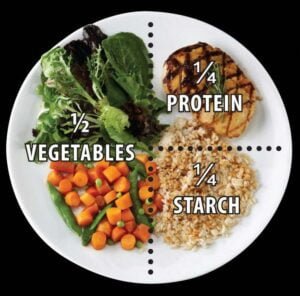Polycystic Ovary Syndrome (PCOS) is a common hormonal disorder that affects people with ovaries, often during their reproductive years. It is characterized by irregular menstrual cycles, high levels of androgens (male hormones), and the presence of small cysts on the ovaries. One of the key aspects of managing PCOS is adopting a holistic approach, including lifestyle changes such as regular exercise and a balanced diet. In this blog, we will delve into the intricacies of PCOS dietary management to help individuals navigate this condition effectively.
Contents
Understanding PCOS and its Link to Diet

The connection between PCOS and diet lies in the role of insulin and its impact on hormonal balance. Insulin is a hormone produced by the pancreas, and its primary function is to regulate blood sugar (glucose) levels. In individuals with insulin resistance, cells do not respond appropriately to insulin, leading to higher levels of both insulin and glucose in the bloodstream.
- Insulin Resistance and Androgen Levels: Insulin resistance is believed to contribute to elevated androgen levels. When insulin levels are high, the ovaries may produce more androgens, disrupting the normal balance of hormones.
- Impact on Ovulation: Insulin resistance can also affect ovulation. High insulin levels may interfere with the ovarian follicles’ maturation process, leading to the formation of cysts on the ovaries and irregular menstrual cycles.
- Weight Management: There is a strong association between PCOS and obesity. Excess body weight, especially abdominal fat, can exacerbate insulin resistance and hormonal imbalances. Therefore, maintaining a healthy weight through diet and exercise is a key aspect of PCOS management.
- Inflammation: Chronic low-grade inflammation is another factor associated with PCOS. Certain dietary choices, such as consuming a diet high in processed foods and sugars, may contribute to inflammation. Anti-inflammatory foods, on the other hand, can help mitigate this effect.
Dietary Strategies for PCOS Management
Managing PCOS often involves a combination of lifestyle changes, including dietary strategies. It’s important to note that individual responses to dietary changes may vary, and consulting with a healthcare professional or a registered dietitian is advisable for personalized advice. Here are some general dietary strategies that may help manage PCOS:
Balanced Macronutrients
Balanced macronutrients play a crucial role in managing PCOS by helping regulate blood sugar levels, improving insulin sensitivity, and supporting overall metabolic health. Here’s a breakdown of how each macronutrient contributes to a balanced diet for PCOS management:
Carbohydrates:
- Choose complex carbohydrates with a low glycemic index (GI), as they have a slower impact on blood sugar levels. Examples include whole grains (brown rice, quinoa, oats), legumes, fruits, and non-starchy vegetables.
- Avoid or limit highly processed and refined carbohydrates, such as white bread, sugary cereals, and pastries, which can lead to rapid spikes in blood sugar.
Proteins:
- Include lean protein sources in your diet to help with satiety and muscle maintenance. Good protein sources include poultry, fish, lean meats, tofu, legumes, and low-fat dairy products.
- Protein-rich foods can also help regulate appetite and prevent overeating, contributing to weight management, which is often important in PCOS.
Fats:
- Choose healthy fats, such as monounsaturated and polyunsaturated fats found in avocados, nuts, seeds, and olive oil.
- Include fatty fish (like salmon and mackerel) as sources of omega-3 fatty acids, which may have anti-inflammatory effects and can support hormonal balance.
Complex Carbohydrates

Limiting processed foods and added sugars is a crucial aspect of managing PCOS, as it can help regulate blood sugar levels, improve insulin sensitivity, and support overall health. Here’s a more detailed explanation of why and how to limit processed foods and added sugars in the context of PCOS management:
Insulin Sensitivity:
- PCOS is often associated with insulin resistance, where the body’s cells become less responsive to insulin. This condition can lead to elevated blood sugar levels and an increased risk of type 2 diabetes.
- Processed foods, especially those high in refined carbohydrates and added sugars, can cause rapid spikes and crashes in blood sugar levels, exacerbating insulin resistance.
Weight Management:
- Many processed foods are calorie-dense and low in nutrients, contributing to weight gain.
- Excess weight can worsen insulin resistance and hormonal imbalances associated with PCOS.
Inflammation:
- Processed foods often contain high levels of unhealthy fats, artificial additives, and preservatives, which can contribute to inflammation.
- Chronic inflammation is linked to various health issues, including PCOS symptoms.
Hormonal Balance:
- High sugar intake can lead to an increase in insulin levels, which, in turn, may disrupt the balance of sex hormones like estrogen and testosterone.
- Maintaining hormonal balance is crucial for managing PCOS symptoms.
Energy Levels and Mood:
- Processed foods and added sugars can lead to energy crashes and fluctuations in mood.
- Stable energy levels are essential for managing stress and promoting overall well-being.
Healthy Fats
Incorporating healthy fats into your diet is an essential dietary strategy for managing PCOS. Healthy fats play a role in hormonal balance, insulin sensitivity, and overall metabolic health. Here are some dietary strategies related to healthy fats for PCOS management:
- Choose Monounsaturated Fats: Include sources of monounsaturated fats in your diet, such as avocados, olives, and olive oil. These fats are heart-healthy and can help with insulin sensitivity.
- Include Polyunsaturated Fats: Consume foods rich in polyunsaturated fats, especially omega-3 fatty acids. Fatty fish like salmon, mackerel, and sardines are excellent sources. Walnuts, chia seeds, and flaxseeds also provide omega-3s.
- Use Cooking Oils Wisely: Opt for cooking oils high in unsaturated fats, such as olive oil, avocado oil, and canola oil. These oils are better choices compared to oils high in saturated fats.
- Eat Fatty Fish: Incorporate fatty fish into your diet at least twice a week. Fatty fish not only provide omega-3 fatty acids but also offer protein and other essential nutrients.
- Snack on Nuts and Seeds: Include a variety of nuts and seeds in your diet, such as almonds, walnuts, chia seeds, and flaxseeds. These snacks are rich in healthy fats, fiber, and other nutrients.
- Avocado as a Nutrient-Rich Option: Add avocados to salads, sandwiches, or as a topping for various dishes. Avocados contain monounsaturated fats and are a good source of vitamins and minerals.
- Limit Saturated and Trans Fats: Reduce the intake of saturated and trans fats found in processed foods, fried foods, and certain baked goods. These fats can contribute to inflammation and insulin resistance.
Mindful Eating and Portion Control

Mindful eating and portion control are valuable dietary strategies for managing PCOS, as they can help regulate blood sugar levels, support weight management, and promote a healthier relationship with food. Here are some guidelines for incorporating mindful eating and portion control into your PCOS management plan:
- Practice Mindful Eating: Eat without distractions, such as watching TV or using electronic devices. Pay attention to the sensory aspects of your meal, including taste, texture, and aroma. Chew your food slowly and savor each bite. This allows your body to recognize feelings of fullness more effectively.
- Listen to Hunger and Fullness Signals: Tune in to your body’s hunger and fullness cues. Eat when you’re hungry and stop when you’re satisfied. Avoid overeating by giving your body time to register fullness.
- Use Smaller Plates and Bowls: Serve meals on smaller plates and use smaller bowls to help control portion sizes. This can create a visual cue that may prevent overeating.
- Portion Out Snacks: Instead of eating directly from a larger package, portion out snacks into smaller containers or bags. This can prevent mindless snacking and help you be more aware of your intake.
Hydration

Hydration is an essential component of overall health and can be a supportive dietary strategy for managing PCOS. Adequate hydration contributes to various bodily functions, including metabolic processes, digestion, and hormonal balance. Here are some hydration-related strategies for PCOS management:
- Drink Plenty of Water: Water is the best choice for staying hydrated. Aim to drink at least eight 8-ounce glasses of water per day, but individual needs may vary.
- Choose Herbal Teas: Herbal teas, such as peppermint or chamomile, can be hydrating and provide additional health benefits without added calories. Avoid excessive consumption of caffeinated teas, as they may have diuretic effects.
- Limit Sugary Drinks: Reduce or eliminate the consumption of sugary beverages like sodas, sweetened juices, and energy drinks. These drinks can contribute to excess calorie intake and may negatively impact blood sugar levels.
- Be Mindful of Added Sugars in Beverages: Check labels for added sugars in beverages, including sports drinks and flavored waters. Opt for unsweetened varieties whenever possible.
- Infuse Water with Flavor: If you find plain water unappealing, infuse it with natural flavors by adding slices of fruits (e.g., citrus, berries), cucumber, or mint. This can make hydration more enjoyable.
Conclusion
In conclusion, adopting a holistic approach to PCOS management involves mindful dietary strategies that prioritize balanced macronutrients, fiber-rich foods, and healthy fats. Incorporating portion control, mindful eating practices, and staying well-hydrated further enhances overall well-being. These measures aim to regulate blood sugar levels, support weight management, and promote hormonal balance. Consulting with healthcare professionals and registered dietitians ensures personalized guidance.
By embracing these lifestyle changes, individuals with PCOS can foster a sustainable and individualized path toward improved health and symptom management. If you are facing PCOS-related issues, PCOS treatment at HerMantra can help. Book your free trial online Pcos treatment session now.


